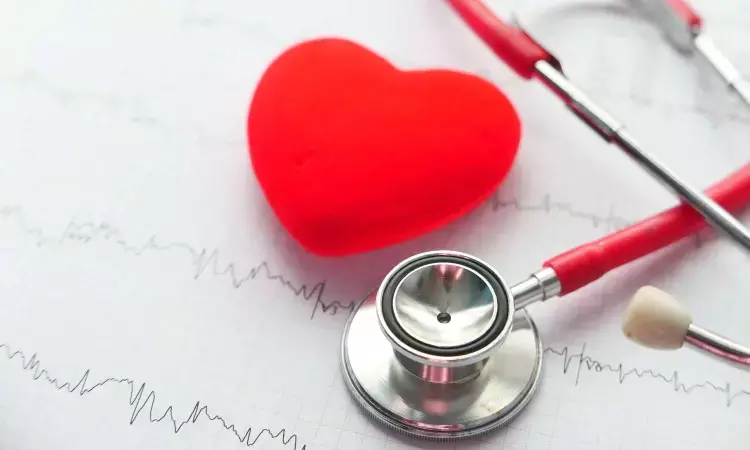- Home
- Medical news & Guidelines
- Anesthesiology
- Cardiology and CTVS
- Critical Care
- Dentistry
- Dermatology
- Diabetes and Endocrinology
- ENT
- Gastroenterology
- Medicine
- Nephrology
- Neurology
- Obstretics-Gynaecology
- Oncology
- Ophthalmology
- Orthopaedics
- Pediatrics-Neonatology
- Psychiatry
- Pulmonology
- Radiology
- Surgery
- Urology
- Laboratory Medicine
- Diet
- Nursing
- Paramedical
- Physiotherapy
- Health news
- Fact Check
- Bone Health Fact Check
- Brain Health Fact Check
- Cancer Related Fact Check
- Child Care Fact Check
- Dental and oral health fact check
- Diabetes and metabolic health fact check
- Diet and Nutrition Fact Check
- Eye and ENT Care Fact Check
- Fitness fact check
- Gut health fact check
- Heart health fact check
- Kidney health fact check
- Medical education fact check
- Men's health fact check
- Respiratory fact check
- Skin and hair care fact check
- Vaccine and Immunization fact check
- Women's health fact check
- AYUSH
- State News
- Andaman and Nicobar Islands
- Andhra Pradesh
- Arunachal Pradesh
- Assam
- Bihar
- Chandigarh
- Chattisgarh
- Dadra and Nagar Haveli
- Daman and Diu
- Delhi
- Goa
- Gujarat
- Haryana
- Himachal Pradesh
- Jammu & Kashmir
- Jharkhand
- Karnataka
- Kerala
- Ladakh
- Lakshadweep
- Madhya Pradesh
- Maharashtra
- Manipur
- Meghalaya
- Mizoram
- Nagaland
- Odisha
- Puducherry
- Punjab
- Rajasthan
- Sikkim
- Tamil Nadu
- Telangana
- Tripura
- Uttar Pradesh
- Uttrakhand
- West Bengal
- Medical Education
- Industry
Cumulative High blood pressure can cause premature cardiac damage during adolescence

Finland: Increased blood pressure or hypertension can cause premature cardiac damage during adolescence, worsened by young adulthood, is the conclusion drawn from a recent study published in the Journal of Paediatrics.
The study showed that cumulative elevated systolic and diastolic BP/hypertension was linked with cumulative early cardiac damage, regardless of obesity, sex and arterial stiffness status. Further, it was seen that higher diastolic BP might temporally precede premature cardiac damage.
It is well known that elevated blood pressure and hypertension are ‘silent killer diseases’ in adults that result in kidney, heart, vascular, and brain damage and death. Annually, hypertension treatment costs billions of dollars in health care worldwide and is associated with rising health emergencies such as heart attack and stroke. The European Society of Cardiology/European Society of Hypertension classifies blood pressure 130/85 mmHg as high-normal and 140/90 mmHg as hypertension. The American College of Cardiology/American Heart Association classifies blood pressure 130/80 mmHg as hypertension.
In 2020, the United States Preventive Services Task Force concluded: “that the evidence to support screening for high blood pressure in children and adolescents is insufficient and that the balance of benefits and harms cannot be determined.”
However, it was reported last year (2022) that increased systolic blood pressure during childhood was associated with the risk of premature death in the mid-forties. Nonetheless, the earliest time revealing potential high blood pressure-related heart damage in a general population of children and adolescents remains unknown. In addition, the lack of repeated echocardiography measurements is unclear whether high blood pressure greater than 130/85 mmHg has a causal role in premature heart damage in the young population.
The current study was conducted among 1,856 adolescents, of whom 1,011 were female. The adolescents were 17 years old at baseline and were followed up for 7 years until young adulthood at age 24 years. Elevated blood pressure, hypertension, and evidence of heart damage were assessed at baseline and follow-up. Signs of heart structure damage are left ventricular hypertrophy and high relative wall thickness. In contrast, signs of heart function damage are left ventricular diastolic dysfunction and increased left ventricular filling pressure.
During the 7-year follow-up period, the prevalence of elevated blood pressure and hypertension and heart damage among adolescents doubled. With extensive control for fat mass, muscle mass, glucose, lipids, smoking status, sedentary time, physical activity, and family history of cardiovascular disease, and using adults’ cut points for diagnosing heart damage, it was observed that high blood pressure and hypertension caused premature heart damage in both males and females.
Importantly, specific characteristics of elevated blood pressure and hypertension-related heart damage were observed in each sex. For example, among males, high systolic blood pressure and hypertension were associated with approximately 10–30% increased risk of heart function damage, but there was no risk of heart structure damage. However, among females, high systolic blood pressure and hypertension were associated with approximately 60–217% increased risk of heart structure damage and 35–65% increased risk of heart function damage.
“This novel evidence on the deleterious effect of high blood pressure and primary hypertension on the heart of the young population is alarming. Delay initiating blood pressure screening in adolescence is unjustifiable considering the amount of heart damage and potentially premature death that could be prevented. Therefore, public health experts, health policymakers, health journalists and bloggers, paediatricians, and caregivers are encouraged to raise awareness of the critical danger high blood pressure and hypertension pose to young people. There should be a push for legislative changes that enforce blood pressure screening in adolescents because this may significantly lower hypertension-related emergencies in adulthood,” says Andrew Agbaje, a physician and clinical epidemiologist at the University of Eastern Finland.
Reference:
Andrew O. Agbaje, Elevated Blood Pressure and Worsening Cardiac Damage During Adolescence, Published:March 02, 2023 DOI:https://doi.org/10.1016/j.jpeds.2023.02.018
Dr Kamal Kant Kohli-MBBS, DTCD- a chest specialist with more than 30 years of practice and a flair for writing clinical articles, Dr Kamal Kant Kohli joined Medical Dialogues as a Chief Editor of Medical News. Besides writing articles, as an editor, he proofreads and verifies all the medical content published on Medical Dialogues including those coming from journals, studies,medical conferences,guidelines etc. Email: drkohli@medicaldialogues.in. Contact no. 011-43720751


